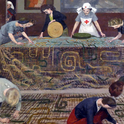Dominic Sandbrook is speaking about Gordon of Khartoum. He lowers his voice to a reverent whisper, leans into his microphone and tells me of “an imperial hero, an adventurer, who ended his days on the steps of the Residency in Khartoum, being speared by Jihadists”. The historian is speaking to me via Zoom, in the office at his new house, surrounded by shelves of unsettled books, frames and tangled cables. He wears a loosely buttoned checked shirt and is partly obscured by a large Røde microphone.
Gordon was the subject of The Rest is History’s 141st and 142nd episodes, the two-parter where Sandbrook and his co-host Tom Holland discovered the formula that would turn their podcast into an Anglospheric phenomenon. “You could just tell these stories—once people knew a lot about them, now they don’t—and just enjoy them,” he says. “Not be censorious. Not be judgemental.”
The Rest is History began in 2020, but Sandbrook first met Holland nearly 20 years earlier at a charity quiz. “Never in my most dark and depressing nightmares did I think that I would have to stare at his face, day after day, hour after hour,” he jokes, with a similar tone to the one that speared General Gordon. Now they record two episodes a week, as well as a bonus episode for paying subscribers, which attract over 15m audio downloads and nearly three million YouTube views each month.
As a child, he says, he was “a romantic nerd”, obsessed with King Arthur and Alexander the Great. “Human beings are creatures of story, and ‘what happened next?’ is at the centre of history: once you deny that, you lose some of the initial spark that gets people interested from a young age.” Sandbrook is an inveterate creature of story, less of a showman than Holland but prone to narrative flight.
His early success came with a series of books on postwar Britain, which cover the period from 1956 with Never Had It So Good through to 1982 with Who Dares Wins. Reading the Daily Mirror “pretty much every day in the 1960s and 1970s” for research, he says, formed the core Sandbrookian principle: that “most people are not interested in the great events to think of”, and also “regard politics as very boring and annoying, and think people who are interested in it are freaks”.
How does today’s Britain compare to the 1970s? “There has been an increasingly strong sense that nothing really works,” he says, but such thinking is mostly prevalent among elites where there’s “a crisis of governability”. “Ordinary people,” he believes, “don’t want miserabilism.” Like that offered by Keir Starmer? Yes. “He reminds me a bit of a 1970s politician,” Sandbrook says. “He thinks Britain is stuck in a doom-loop, and that he must immediately schedule some more committee meetings.”
Last November, Sandbrook appeared on his sister podcast The Rest is Politics’s US Election Special. He was the only person on a panel of five, hosted by Alastair Campbell and Rory Stewart, to predict Donald Trump’s victory. “The absolute last thing I would do is say anything disobliging about a fellow Goalhanger show, especially one so highly regarded as The Rest is Politics,” he says. “But I think they had maybe drunk their own Kool-Aid a little bit.”
Looking back on five years of The Rest is History, Sandbrook says that he “just feel[s] so lucky to have been caught up in something like that, to be part of a phenomenon”, even if it means “living a permanent essay crisis”. But what about the next five years? “We have a whole list of subjects we’d like to do… that would keep us busy for years.” He lists topics—the Boer War, the Zulu Wars, many other wars, and the upcoming history of Chatham High Street—and only then does he realise “it’s much more likely that we’ll die than it is that we’ll run out of history”.









